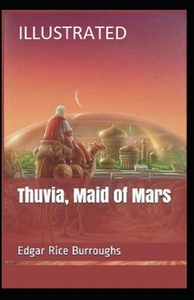You need to sign in or sign up before continuing.
Take a photo of a barcode or cover
Thuvia and the son of John Carter shared the spot light in this short but interesting book, where quite a novel premise is introduced. This story is much the textbook example of "damsel in distress", but provides some oppurtunities for Thuvia to shine.
Story above John Carter's son Carthoris and Thuvia. Entertaining, but not as globe spanning as the first three novels.
adventurous
fast-paced
Better than book 3, this slightly tangled narrative brings in even wackier Barsoomians with mighty mental powers who are still petty asses just like everyone else on Mars. Thuvia should have been more badass; recognizing the times, I get why she wasn't, but there are constant references throughout the books to Barsoomian women taking up weapons when needed and being in some ways better with them, but here in this book, when it would have been great, Thuvia doesn't do that. She's more the object of the story than the subject (not surprisingly, again given the time) but her handy ability to make banths do her bidding at least means she plays a part now and again.
Carthoris is like boring John Carter. Let us never have him feature as protagonist again, okay?
Carthoris is like boring John Carter. Let us never have him feature as protagonist again, okay?
Another book in the Barsoom series. This is the worst I've read so far but I still consider it a book worth reading.
It is a short and easy to read adventure book. You're not going to find the originality of the first books nor the same depth but only action. In this book things seem to happen without clear reasons breaking the rules of what was stated in the previous books. Characters behave in a way you don't expect and the author doen't provide a plausible explanation for their actions. Things just happen to keep the story moving.
It is a short and easy to read adventure book. You're not going to find the originality of the first books nor the same depth but only action. In this book things seem to happen without clear reasons breaking the rules of what was stated in the previous books. Characters behave in a way you don't expect and the author doen't provide a plausible explanation for their actions. Things just happen to keep the story moving.
This is the fourth book in the Mars series by Edgar Rice Burroughs, but the first in where John Carter is not the hero. Instead, it focuses on his son, Carthoris.
My first reaction was a mild disappointment with the change. After the first three novels, my emoting with John Carter was deep and I wasn't at first ready for the transition but after a few chapters, I had settled in.
The plot to kidnap Thuvia seemed overly complicated at first as I did not comprehend the intentions of the captors on their initial plan. The whole taking her to a long-abandoned city in the south of Mars made no sense. It became obvious that the author was not worried about reason, only wanting to establish a new setting and characters not previously discovered in the previous novels. The whole 'mentally projected archers' thing also didn't work for me.
Nevertheless, like the first three novels, there is plenty of heroics, lots of battles, and a number of challenges, both mental and physical, for the hero, all things I had come to expect so all enjoyable.
The final result, 4 stars. The previously mentioned issues being too much to overlook to go 5.
My first reaction was a mild disappointment with the change. After the first three novels, my emoting with John Carter was deep and I wasn't at first ready for the transition but after a few chapters, I had settled in.
The plot to kidnap Thuvia seemed overly complicated at first as I did not comprehend the intentions of the captors on their initial plan. The whole taking her to a long-abandoned city in the south of Mars made no sense. It became obvious that the author was not worried about reason, only wanting to establish a new setting and characters not previously discovered in the previous novels. The whole 'mentally projected archers' thing also didn't work for me.
Nevertheless, like the first three novels, there is plenty of heroics, lots of battles, and a number of challenges, both mental and physical, for the hero, all things I had come to expect so all enjoyable.
The final result, 4 stars. The previously mentioned issues being too much to overlook to go 5.
I think Thuvia is my favorite character so far in this series.
adventurous
lighthearted
fast-paced
Plot or Character Driven:
A mix
Strong character development:
No
Loveable characters:
Yes
Diverse cast of characters:
Complicated
Flaws of characters a main focus:
No
This series continues to be authentically pulp adventure--over the top, but a lot of fun. Interesting to see the focus shift to John Carter's son, as John Carter's story arc finally fully resolved in the previous book.
Moderate: Death
Minor: Sexual assault, Violence
Burroughs is at his best when he combines the impetus of pulp adventures with the unselfconsciously far flung. When he gets too tied down to an idea or progression, it tends to hinder his imagination somewhat.
The alien setting of the Mars books then proves a great boon to Burroughs, since it is unfettered by much need for suspension of disbelief. The series has its highs, but it also has lows, like this book.
In it, he explores many of the same things he has in the previous books, casting John Carter's son in his father's image, and giving him the same class of adventure. He fights an endless succession of monsters and soldiers, rescuing a standoffish princess, navigating war and politics, facing a sex-starved sadist, befriending a noble local warrior, and uncovering an ancient, mysterious culture.
Unfortunately, the story doesn't have quite the same punch the second time through, even if there is some enjoyable variance in the details. Carter had more character than his son, and Burroughs once again gets in the same trouble he did in Tarzan: trying to explain the main character's unusual powers.
John Carter was a mighty warrior on Mars because its lower gravity gave him the ability to leap further, hit harder, and carry more. Why his son has the same powers, Burroughs seems less sure, suggesting that Earthlings are merely mightier, despite the fact that all the creatures on Mars are huge and massively muscled.
Just as in Tarzan, his notion that 'blood will out' is poorly contrived, even by the scientific notions of the time. This book is a romp, but lacks the verve of the first book and the bizarre pseudospiritual metaphysics of the second.
The alien setting of the Mars books then proves a great boon to Burroughs, since it is unfettered by much need for suspension of disbelief. The series has its highs, but it also has lows, like this book.
In it, he explores many of the same things he has in the previous books, casting John Carter's son in his father's image, and giving him the same class of adventure. He fights an endless succession of monsters and soldiers, rescuing a standoffish princess, navigating war and politics, facing a sex-starved sadist, befriending a noble local warrior, and uncovering an ancient, mysterious culture.
Unfortunately, the story doesn't have quite the same punch the second time through, even if there is some enjoyable variance in the details. Carter had more character than his son, and Burroughs once again gets in the same trouble he did in Tarzan: trying to explain the main character's unusual powers.
John Carter was a mighty warrior on Mars because its lower gravity gave him the ability to leap further, hit harder, and carry more. Why his son has the same powers, Burroughs seems less sure, suggesting that Earthlings are merely mightier, despite the fact that all the creatures on Mars are huge and massively muscled.
Just as in Tarzan, his notion that 'blood will out' is poorly contrived, even by the scientific notions of the time. This book is a romp, but lacks the verve of the first book and the bizarre pseudospiritual metaphysics of the second.
This book doesn't star John Carter, Virginian, Civil War veteran, and now Warlord of Mars, but his son Carthoris. Carthoris just isn't as interesting a protagonist, we don't really know his place in Barsoom, and for that matter Thuvia's either so the tension just wasn't there for me. The lost city of Lothar was just too easy to find and escape from and it's inhabitants weren't that interesting. I glad I read it because overall I enjoy the literary world of Barsoom but I'd rate this book in the series a 2.5 if Goodreads allowed.


